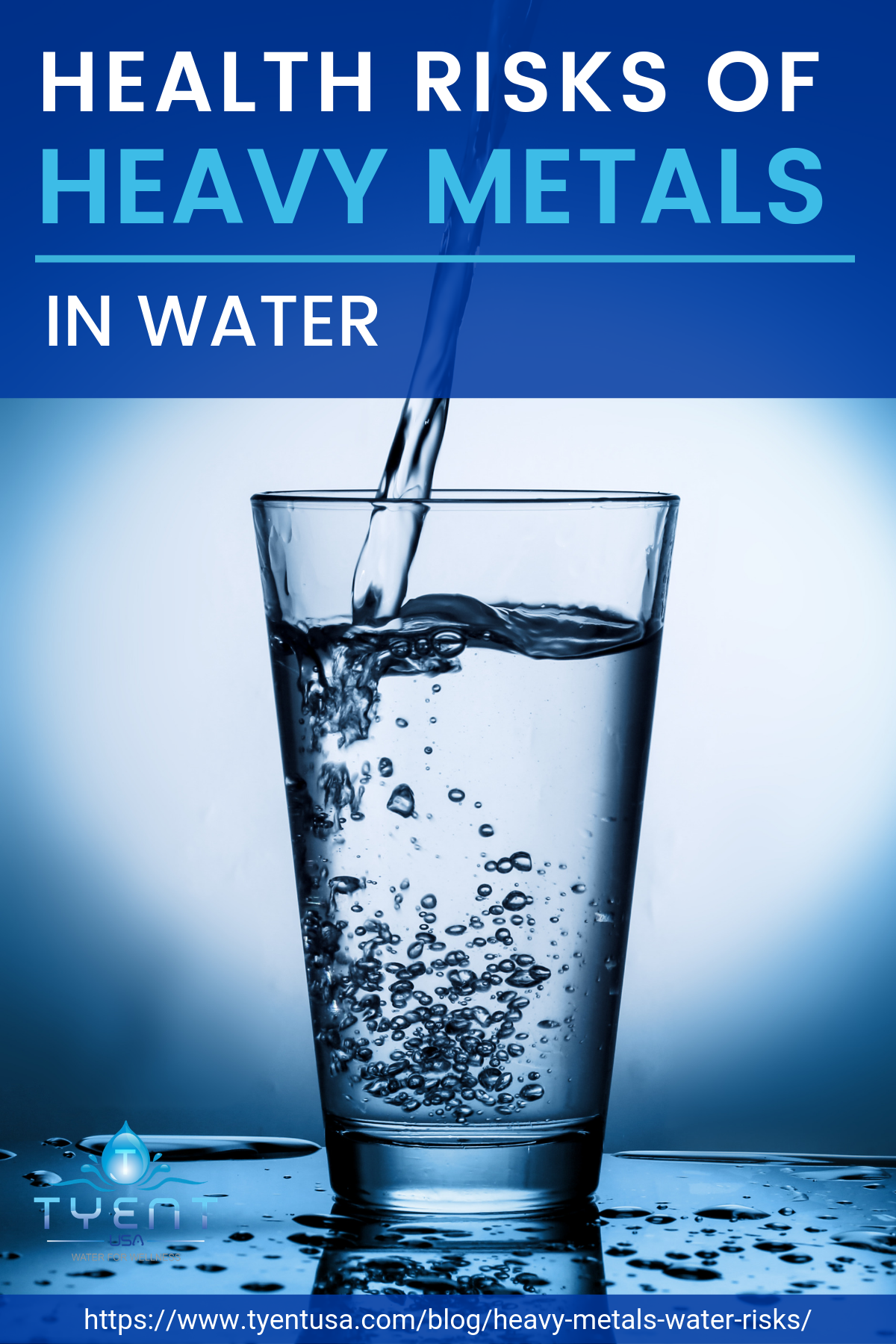Beware of the toxins and read on for a rundown of the health risks of heavy metals found in drinking water.
RELATED: Five Reasons To Never Drink Unfiltered Water
In this article:
- What Are Heavy Metals?
- Where Do Heavy Metals Come From?
- How Does Water Become Exposed to Heavy Metals?
- How Can I Test My Water for Toxicity?
- Why Are Heavy Metals in Water Dangerous to Our Health?
- What Are the Symptoms of Heavy Metal Toxicity?
- Who Is More Susceptible to the Health Risks of Heavy Metals?
- When Should I Undergo a Heavy Metals Detox?
Running the Health Risks of Water Exposed to Toxic Heavy Metals
What Are Heavy Metals?
Heavy metals are natural compounds and formations contained in the earth’s crust. Sometimes, natural elements aren’t always good for us and that’s the case with these elements.
Fifty elements in the periodic table are toxic heavy metals and 17 of these elements have a ‘highly toxic’ classification. Some of these toxic heavy metals include mercury, lead, arsenic, cadmium, and dioxin.
Not all, though, have a high toxicity level. Some are healthy minerals which the body needs.
The minerals included in the list of heavy metals which are essential are iron, zinc, manganese, and copper.
Small doses of these heavy metals are good for the body. But in larger doses, these minerals can be toxic for us.
Where Do Heavy Metals Come From?
Heavy metals are naturally occurring elements in the Earth’s crust. But, there are also some amounts even in basic household items.
- Public water
- Beauty products
- Pesticides and herbicides
- Dental fillings
- Furniture
- Some pharmaceutical drugs
- Car keys and house keys
- E-cigarettes
- Vehicle exhaust and other forms of air pollution
How Does Water Become Exposed to Heavy Metals?

Rampant and constant urbanization and industrialization are responsible for the presence of heavy metals in our water system. Heavy metals can enter our public waterways via industrial waste and from underground water supply contamination.
They can also contaminate the air we breathe. Here are some of the ways they can enter the atmosphere:
- Coal-burning factories
- Waste incinerators
- Old house paint and plumbing
- Emissions from smelters
- Mining extractions
- Fracking
How Can I Test My Water for Toxicity?
You can test your water quality at home with a home test kit, or by getting our Free Water Report ($99 Value). Testing your water for harmful levels of heavy metals, toxic compounds, and bacteria is important for protecting your family against health risks.
Purchase a home water quality test kit which contains different strips for lead, bacteria, pesticides, chlorine, hardness, and pH levels. These test strips can tell you which compounds your water is exposed to by changing color based on your water mineral content.
Engage your senses when checking your water quality at home, although you really can’t get a guaranteed result, it can be a start. Remember, many heavy metals can be odorless and tasteless. Take a clean container and fill it with water.
Try to smell the water, noting any odors or smells which resemble bleach, rotten eggs, or a musty scent. These strong odors can indicate plumbing issues and problems with your water treatment plant.
Drink a bit of the water sample to see if it tastes like bleach or has a salty flavor. Try to observe its color and if it looks cloudy.
Ideally, water should be clear, odorless, tasteless (or at least, doesn’t have a strong metallic or salty taste). Anything out of the ordinary warrants a call to your plumber, local municipality, or Environmental Protection Agency.
Why Are Heavy Metals in Water Dangerous to Our Health?
Prolonged and constant exposure to heavy metals can cause several health problems like damage to the nervous system, organ failure, physical underdevelopment, reduced energy levels, and even cancer.
Mercury and lead exposure can cause autoimmunity. This is where the immune system attacks its own cells leading to ailments like kidney disease, problems with the nervous system, and rheumatoid arthritis.
Mercury can also eat up the body’s antioxidant reserves, making the body vulnerable to oxidative stress and damage. This can then cause a higher risk of cardiovascular disease and other dangerous ailments.
Oxidative Stress Definition: an imbalance between the number of free radicals in the body and its ability to fight or detoxify their harmful effects through antioxidant neutralization.
Long term exposure and ingestion of heavy metals have been linked to dementia, Alzheimer’s, depression, anxiety, and other neurological conditions.
RELATED: 13 Reasons Why You Shouldn’t Drink Tap Water
What Are the Symptoms of Heavy Metal Toxicity?

The symptoms of heavy metal toxicity can differ depending on the type of metal you’ve been overexposed to. The most common ones people have prolonged and constant exposure to are lead, mercury, cadmium, and arsenic.
Some acute symptoms arising from overexposure to these heavy metals include:
- Headaches
- Breathing difficulties
- Abdominal cramping and pain
- Nausea
- Vomiting
- Diarrhea
If you constantly experience the symptoms listed above, don’t wait until your symptoms become worse. Severe cases of heavy metal toxicity and poisoning may include the following symptoms:
- Burning and tingling sensations in the body
- Brain fog
- Chronic infections
- Visual disturbances
- Insomnia
- Body paralysis
Who Is More Susceptible to the Health Risks of Heavy Metals?
Infants, young children, and fetuses in the mother’s womb are more sensitive and vulnerable to exposure to heavy metals. The toxins found in them can disturb and retard the rapid development of their growing bodies from a young age.
Prolonged exposure can cause children to have growth problems, memory impairment, learning difficulties, damage to the nervous system, and behavioral issues like ADHD or ADD. Extreme exposure to heavy metals can also cause irreversible brain damage.
It’s important to be vigilant about children’s exposure to these toxic elements. They can cause health risks and problems which can affect them well into puberty and adulthood.
When Should I Undergo a Heavy Metals Detox?
Heavy metals testing is important for anyone who believes they might have excessive exposure to these toxic metals. Even if you elect not to undergo a toxicity test, lifestyle changes and a healthy diet can be beneficial for the proper functioning of the immune system and healthy organs.
The main goal of a heavy metal detox is to remove the heavy metals accumulated in the nervous system. Detoxification will also benefit organs like the liver, the heart, kidneys, respiratory system, and lymphatic system.
The most common way to remove toxins from the body is through a process called chelation therapy. This medical procedure involves administering chelating agents in the body to remove heavy metals.
These chelating agents bind to the toxic molecules and allow them to dissolve and exit the body through urine.
Chelation can work with glutathione and other similar molecules in promoting excretion of heavy metals and toxins.
Healthy dietary changes and taking herbs or supplements can also help break down heavy metals into small molecules. The body can then excrete them through bodily wastes — namely urine, feces, and sweat.
It’s important to do a heavy metals detox to protect the body from the health risks of toxicity. There are several benefits in undergoing a major detox cleanse.
- Reduced oxidative stress and damage from free radicals
- Improved energy levels
- Enhanced gut health and immunity
- Improved mental performance for learning, memory, attention, etc.
- Better digestive function
- Glowing skin
The health risks of heavy metals can begin even before we are born into the world. As we grow older, we constantly expose ourselves to these toxins.
The objects which carry them are mostly harmless which is why we won’t immediately notice it until the symptoms arise and worsen.
Now that you’re aware of the health risks heavy metals in water and other everyday items have, it’s best to be more vigilant and meticulous about our health! Opt to deliver safe drinking water to your household with quality water ionizers.
Check out our product lineup for a model that will suit your needs.
What are some ways you detox your body from heavy metals? Share your thoughts with us in the comments section below!
Up Next:
- 7 Reasons Why Acidic Water Is Bad For You
- PFAS Water Contamination And What You Can Do
- 3 Reasons To Think Before You Drink Reverse Osmosis Water




![Is Tap Water Safe? Everything You Need to Know [2024] tap water](https://www.tyentusa.com/blog/wp-content/uploads/2024/10/Screenshot-2024-10-22-081930-150x150.png)





